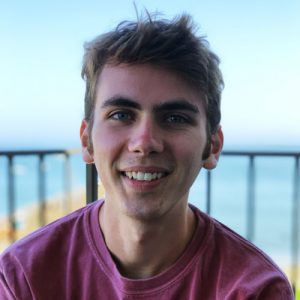
No Love Lost: Finding Self-Love through Personal Acceptance
In honor of February, the month of love, we asked members of our Springtide Ambassadors Program (SAP) to share how they’ve made personal strides toward greater self-love or self-care. For some, acknowledging their identities led them toward greater self-love. Below, SAP members Leo and Anthony discuss how their journeys to recognize who they truly were resulted in a deeper love for themselves.
As a kid, growing up as a young male dancer, all I wanted in life was to be accepted by the other boys. Being put down for doing what I loved and delegitimized from expressing my masculinity, I was led to either rejecting the desired traits of others or rejecting myself. As I went through grade school I began to reject who I was, leading me to completely separate my in-school identity from who I was out of school. If someone asked, “Are you a dancer?” I would simply deny it. Putting in my best effort to act like someone I was not made me socially anxious around people I considered friends, which made it difficult for me to talk to them in a natural way. Therefore, I didn’t fit in.
It wasn’t until the second semester of 10th grade that I decided to take pride in who I was. My first step to beginning my self-care journey was letting go of trying to please others. I began to listen to the music I liked listening to, wearing the clothes I liked wearing, and stopped filtering my personality to fit in. I distanced myself from the negative people that were around me. At first, this was very difficult for me because I had lost all of my friends at school, causing me to feel alone and very vulnerable. I was made fun of for embracing who I was, but instead of sheltering myself by catering to others, I continued to show pride in who I was. Another large step in my self-care journey was recognizing that it’s okay to not be okay. Once again this was difficult at first because I realized that I had been rejecting my emotions. This caused them to bottle up, resulting in me either taking those emotions out on others or having full breakdowns.
Something that helped me release these emotions in a positive way was through art. I began using dancing and songwriting to express how I was feeling, which almost became a sort of therapy as I was trying to figure out who I was. This allowed my art to improve as I became healthier and grew into who I wanted to be. An experience that aided this journey was toward the end of my sophomore year when I got COVID-19. Now you may be thinking . . . “How would this support self-care?”. Although I was sick, I had a period of isolation during quarantine. All alone, I had a lot of time to think about who I was, and who I wanted to be. I focused on learning new things such as playing guitar and exploring new styles of dance where I could express myself. As I began treating myself better, I felt more comfortable in my own skin and began to be less anxious in social environments. Recognizing that no one is perfect allowed me to give myself the grace to make mistakes and roll with the punches.

Leo
Springtide Ambassador (16 – Wisconsin)

Leo
Springtide Ambassador
(16 – Wisconsin)
How I have felt about myself has historically been informed by my religious community’s attitude toward people with my sexual identity. And even though I do not identify with that religious community anymore, their theology, religious rationale, and messaging still find ways to interfere with my happiness today as an openly gay man.
When you live in an environment so long that tells you that your desire for love is corrupt, perverse, backward, unnatural, even offensive to the Most High—well, you start to believe it. Then you start to hate the parts of yourself that supposedly threaten the continued support of your community and your God. Next thing you know, you are this miserable mass of flesh that is living in constant denial and self-hatred from fear of being “found out” and given the ultimatum: stay and repent or go and lose everything.
I didn’t start loving myself until I had left that environment and rejected that messaging. Getting to that point, however, was an enormous project—it took time, some crucial friendships, finding a safe place to deconstruct and study my religion outside of the community I was raised in, hearing the voices of other people like me, therapy, and so much more. I didn’t always feel in control of my journey, but as I came out of my shell, I found ways of breaking the spell of self-hatred that was cast over me by my religious captors. When I substituted the love of a church for the love of a friend, and later opened myself to the romantic love of other men––it became easier to also love myself.
Recognizing that the world wouldn’t fall apart if I accepted, rather than denied, my sexuality was a huge turning point. It opened me up to new perspectives, relationships, and spaces that ultimately and over time taught me how to love all of me. Although it is an ongoing process, I am quite proud of my ability to now hold my faith journey and my sexuality in loving harmony. For me, “self-love” means living in the light, and not hiding who I am. It means choosing to believe things about myself that affirm all of my experience. It means challenging anyone or anything that would have me believe I am less than lovely.

Anthony
Springtide Ambassador (23 – California)

Anthony
Springtide Ambassador
(23 – California)



